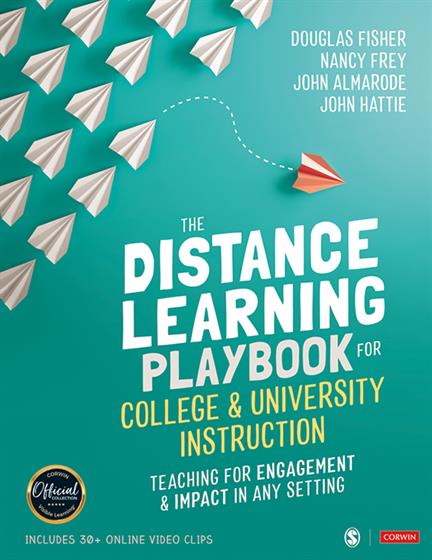
Hands-on, Practical Guidance for Educators
From math,
literacy, equity, multilingual learners, and SEL, to assessment, school counseling,
and education leadership, our books are research-based and authored by experts
on topics most relevant to what educators are facing today.
The Distance Learning Playbook for College and University Instruction
First, let’s commend ourselves: how in the midst of a pandemic we faculty stepped up at record speed to teach in such a foreign learning environment. Try we did, adapt we did, and learn we did. But to be clear, and we already recognize this, this past spring was less about distance learning and more about crisis teaching.
This time around we have the opportunity to be much more purposeful and intentional, and that’s where The Distance Learning Playbook for College and University Instruction will prove absolutely indispensable.
Much more than a collection of cool tools and apps, The Distance Learning Playbook for College and University Instruction mobilizes decades of Visible Learning® research to reveal those evidence-based strategies that work best in an online environment. Supplemented by video footage and opportunities to self-assess and reflect, the book addresses every dynamic that must be in place for students to learn, even at a distance:
- Faculty-student relationships from a distance
- Teacher credibility from a distance
- Teacher clarity from a distance
- Engaging tasks from a distance
- Planning learning experiences from a distance
- Feedback, assessment, and grading from a distance
- Keeping the focus on learning, from a distance or otherwise
What does our post-COVID future hold? “We suspect,” Fisher, Frey, Almarode, and Hattie write, “it will include increased amounts of distance learning. In the meantime, let’s seize on what we have learned to improve post-secondary education in any format, whether face-to-face or from a distance.”
“We are all still active faculty members, committed to teaching, scholarship, and service. The unexpected transition to remote learning doesn’t mean we no longer know how to teach. We can still impact the lives of our students and know that we made a difference. The Distance Learning Playbook for College and University Instruction will show you how.”
~Douglas Fisher, Nancy Frey, John Almarode, and John Hattie
- Grade Level: PreK-12
- ISBN: 9781071838679
- Published By: Corwin
- Year: 2020
- Page Count: 200
- Publication date: August 26, 2020
Price: $32.95





